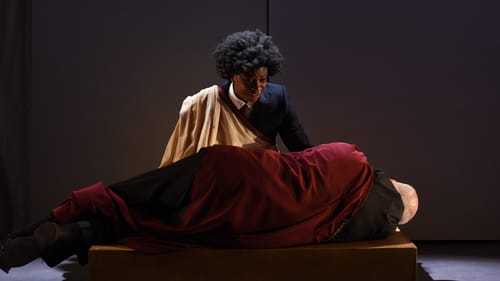Stay in the Loop
BSR publishes on a weekly schedule, with an email newsletter every Wednesday and Thursday morning. There’s no paywall, and subscribing is always free.
Red-state blues
Quintessence Theatre Group presents William Shakespeare's 'Julius Caesar'

Quintessence Theatre Group's staging of Julius Caesar walks a well-defined line between modern innovation and established practices. Director Alexander Burns makes William Shakespeare's history play relevant to modern audiences without gimmicks.
For example, don't expect the titular would-be emperor to be costumed and coiffed to resemble America's current president. However, the cast is costumed in mostly contemporary clothes (with some Roman toga flourishes, by Jane Casanave).
Burns's respect for the story uses projected supertitles and maps by Eyal Lerman to guide us through political and military events. He even incorporates scenes from Shakespeare's contemporaries as a helpful prologue covering the five years before the Roman Senate voted Caesar — victor in Rome's bloody four decades of civil war — dictator for life.
Gender parity
Burns fills the mostly male major roles with women. Though their clothing and hair follow today's male standards, the actors don't impersonate men. Brett Ashley Robinson makes a dynamic Marcus Acilius (i.e., Mark Antony), the faithful ally of Paul Hebron's smooth-talking Caesar. Mary Tuomanen's Cassius is an intelligent and intense politician straight from House of Cards, a splendid foil for Michael Brusasco's upright Marcus Brutus. One of Shakespeare's two female characters, Caesar's wife Calpurnia, is portrayed by Tom Carman for a bit of balance.
Julia Frey, Anita Holland, Maya Lerman, and Kimie Muroya play a variety of male soldiers and bureaucrats convincingly, alongside fellow ensemble actors Michael Gamache and David Pica. At the play's end, it's astounding to see that the production’s dozens of roles are realized by only five men and six women.
The action unfolds on Burns's simple white set — doubling as projection screen — and a few black furniture pieces, cleanly lit by Ellen Moore. An upper level behind the white wall adds some variety, but, as usual, Burns doesn't clutter Shakespeare's words with busy staging.

Words are foremost, spoken clearly and passionately. Though, when action is required, as with Caesar's assassination, J. Alex Cordaro's fight direction makes the act believably bloody; Hebron's Caesar fights like a wounded lion set upon by nervous hyenas.
Shakespearean button-pushing
Burns wisely trusts the play to echo today's political themes in familiar ways. Proclaiming love of country becomes a public contest, especially as senators justify their plot against Caesar — no red hats or Roman-flag lapel pins required.
Mob support for Brutus resembles today's partisan extremism, especially when riled-up citizens attack Cinna the Poet (Holland) because her name is the same as Cinna the Senator (Gamache). The crowd's reactions to politicians' speeches sound like today's immediate media analysis and judgment — they could easily be tweets if Burns wanted to play cute, but we don't need that trick to make the connection.
While modern costumes and music (hard-driving club tunes from Daniel Ison) help today's audience understand and relate, characters' actions and words are what connect us with Shakespeare's themes from one generation to the next. Julius Caesar, like most of Shakespeare's work, easily adapts to contemporary concerns without being reshaped by directors.
Not to demean Shakespeare's genius, but this is in large part because his concerns 400 years ago — about, in Julius Caesar, how power can be abused and even principled people can be overwhelmed by it — are still issues today. Will we ever mature past these themes? Not likely.
What, When, Where
Julius Caesar. By William Shakespeare, Alexander Burns directed. Quintessence Theatre Group. Through April 28, 2018, at the Sedgwick Theater, 7137 Germantown Avenue, Philadelphia. (215) 987-4450 or quintessencetheatre.org.
Sign up for our newsletter
All of the week's new articles, all in one place. Sign up for the free weekly BSR newsletters, and don't miss a conversation.

 Mark Cofta
Mark Cofta